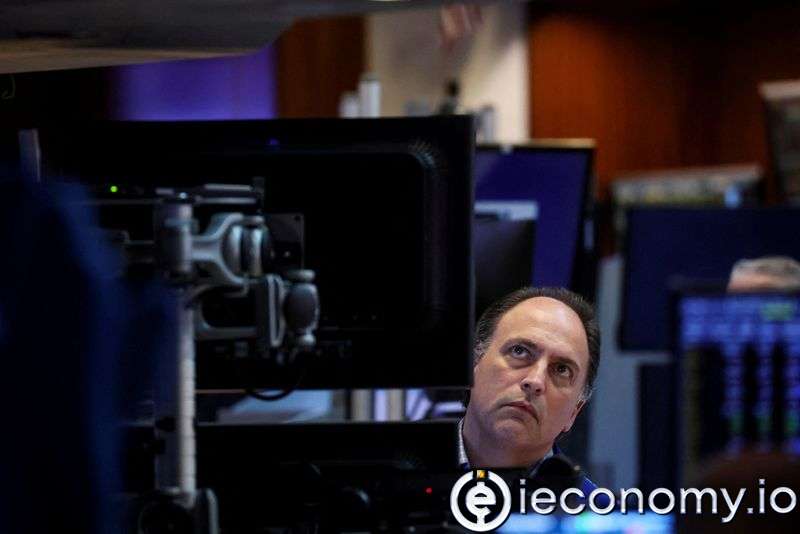11918
0
Top 5 Things to Watch in the Markets in the Week Ahead
After a week in which financial markets were shaken as central banks and governments stepped up the fight against inflation

Yazar: Charles Porter
Yayınlanma: 26 Eylül 2022 08:35
Güncellenme: 3 Mart 2026 09:12
Top 5 Things to Watch in the Markets in the Week Ahead
After a week in which financial markets were shaken as central banks and governments stepped up the fight against inflation, investors will brace themselves for a new round of volatility next week.
Officials from the US Federal Reserve, which is on track for a third 75 basis point rate hike, are expected to speak. The highlight of the US economic calendar will be Friday's data on personal income and spending, including the Fed's preferred inflation gauge. In the Eurozone, Friday's inflation data is expected to put pressure on the European Central Bank. Ahead of that, ECB President Christine Lagarde will testify before lawmakers in Brussels on Monday and the results of Sunday's elections in Italy will also be closely watched. The yen will remain in focus after the Bank of Japan intervened in the FX markets. Meanwhile, Chinese PMI data on Friday will provide insight into the health of the world's number two economy. Here's what you need to know to start the week.Fed speech, US data
St. Louis Fed President James Bullard, Cleveland Fed President Loretta Mester, Chicago Fed President Charles Evans, Atlanta Fed President Raphael Bostic and Fed Vice Chair Lael Brainard are expected to speak during the week, while investors will be on the lookout for signs of a fourth rate hike of 75 basis points in November.Stock sell-off
Wall Street's main indices suffered heavy losses last week, with the Nasdaq falling 5.03% to close down over 5% for the second week in a row, while the S&P 500 lost 4.77% and the Dow 4%. The Dow narrowly avoided joining the S&P 500 and Nasdaq in a bear market. The collapse in bond markets added to the pressure on equities as investors readjusted their portfolios to a world of persistent inflation and rising interest rates. Investors were caught off guard after the Fed said last week that it expected high US interest rates to last until 2023. Although recent data shows that the US economy is relatively strong, investors are worried that the Fed's tightening will push the economy into recession.Eurozone CPI
The Eurozone will release September data on consumer price inflation on Friday, with economists expecting the headline inflation rate to hit a new record high of 9.6%, increasing pressure on the ECB, which is struggling with how much to raise interest rates in the face of a looming recession. Ahead of that, ECB President Christine Lagarde will testify before the Economic and Monetary Affairs Committee in Brussels on Monday, facing questions on how the central bank plans to tackle inflation as the bloc faces the prospect of recession. Investors will also be watching the results of Italy’s election on Sunday which is expected to result in the country’s most right-wing government since World War II.Yen intervention
Japanese authorities intervened in the currency markets on Thursday for the first time since 1998, finally putting an end to the weakness in the yen. The Japanese currency gained 0.3% on the week against the dollar for the first time in more than a month after the move. However, the dollar has gained more than 20% against the yen this year as the Bank of Japan remains committed to ultra-low interest rates and the Fed looks set to continue aggressive rate hikes until inflation is brought under control. So the case for a strong dollar is still valid. Japan could find itself fighting fundamentals, the market and the Fed as its neighbors China and Korea push the dollar back.China PMIs
China's PMI (Purchasing Management Index) data to be released on Friday will be closely watched for indications on whether the nascent economic recovery continued in September. Recent economic data pointed to resilience in August as faster-than-expected growth in factory output and retail sales supported the fragile recovery, but the deepening property slump weakened the outlook. With little sign that China will significantly ease its zero COVID policy anytime soon, some analysts expect the world's second-largest economy to grow by just 3% this year, which would be the slowest since 1976, excluding the 2.2% expansion during the first COVID hit in 2020. Follow Global Economic Developments on Social Media! Click here to follow Ieconomy official Facebook account! Click here to follow Ieconomy official Instagram account! Click here to follow Ieconomy official Twitter account!İLGİLİ HABERLER





European stocks soared and focus shifted to German retail sales after Powell's speech!

Forex Signal For TRY/USD: Inflation Slowdown in November.

Forex Signal For GBP/USD: Bullish Trend Still Not Breaking While Recovery Continues.

Forex Signal For EUR/USD: Starry US Data Points to Higher Fed Increases.

Forex Signal For BTC/USD: Downside Continues as Bitcoin Recovery Moves Less.
En Popüler Haberler
Yorum Yap
Yorumlar
Henüz yorum yapan yok! İlk yorumu siz yapın...